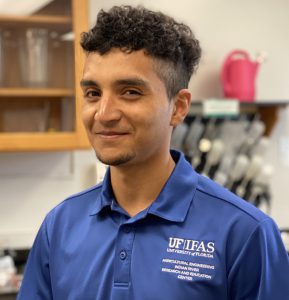The following is an interview with Eduart Murcia, a graduate student pursuing a Master of Science degree in Agricultural and Biological Engineering under the supervision of Dr. Sandra Guzmán. Eduart is part of the Smart Irrigation and Hydrology (SIAH) Laboratory at the University of Florida/IFAS-Indian River Research and Education Center (IRREC) in Fort Pierce. He talks about his graduate experience and how it has advanced his educational and career aspirations.

Question: How did you discover the University of Florida/IFAS Indian River Research and Education Center (IRREC)?
Response: I first came to IRREC as a student intern with Dr. Sandra Guzmán in the Smart Irrigation and Hydrology (SIAH) Laboratory in 2019. After completing my internship, I returned to Colombia and finished my bachelor’s degree in both agricultural and civil engineering at the National University of Colombia. During my time at IRREC, I joined multiple projects in Dr. Guzman’s lab, including nanobubbles, soil moisture sensor-based irrigation for citrus production, data analysis, and water quality for crop production. From this experience, I learned that I wanted my next professional experience to be focused on studying how to improve water management practices and decision-making processes by leveraging the data that is collected from multiple sensors.
Dr. Guzmán offered me the opportunity to work as a master’s student in her lab and that was the perfect opportunity for me to connect my dreams of becoming a data and water scientist that creates innovative tools for sustainable agricultural water management with a real project in citrus production.
Question: Please tell us about your day working in the lab as a team and with independent tasks. How does your day begin, and what tasks do you carry out?
Response: My master’s degree relates to and expands my internship at the IRREC SMART Irrigation and Hydrology Laboratory in 2019.
I work with my teammates on data analysis to make irrigation apps and irrigation scheduling systems easier for the end-user. Our goal is to extract meaningful information from the raw data that is collected in the orchards and use this data to develop tools that can be efficiently used for irrigation management. In my research, I am applying data processing techniques and machine learning to forecast soil moisture, using real-time data from the field and/or the greenhouse.
Our lab team works with two data collection setups. One setup is using a fully controlled and automated irrigation system inside a greenhouse. A second setup is from sensors situated in the field that could have more variable conditions. Both setups are applied to citrus trees. We also use data from weather stations, and one of the Florida Automated Weather Network (FAWN) stations that we have here at IRREC.
The data is gathered, processed, and used along with the machine learning model to have predictions ahead of time of the water status of a field. This will help the grower to have an overview of scenarios of “what ifs”, what if I irrigate or apply fertilizers at this date, or time of the day. Those scenarios will allow better decisions to apply the right volume of water at the right time.
My research work and the work of other team members are being combined in a decision support system called Irrigmonitor.
Question: You aspire to become a master in agricultural engineering; where are you with that right now, and where do you want to go with that goal?
Response: I aspire to become a machine-learning practitioner focusing on water resources management. I know that my background in agricultural engineering combined with new tools that involve AI and data analysis could help us to better understand complex systems that in their unprocessed state are unintelligible to us. For instance, water-related processes in agriculture are complex as they respond to interactions from multiple systems, and here tools like machine learning become handy to tackle this complexity. I believe that my work can contribute to understanding better how to manage irrigation.
I am passionate about water resources and data management, and I find satisfaction in learning new things every day. So, for the next stage of my career, I want to find the best conditions to keep learning and developing useful tools for our society. Doing a Ph.D. in agricultural engineering is an option that I am considering as it is aligned with some of these goals.
Question: What are the most pressing issues in agricultural water management concerning crop production?
Response: One of the biggest challenges for growers is to leverage all the technology and tools that are being created by researchers and get meaning from that. The new technology must be designed for the growers so they can make practical use of it in agricultural production. Right now, there is a gap between researchers and growers in using the new machine-learning technology in the field.
 16
16
